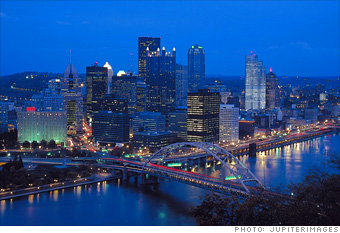
Pittsburgh's main problem has been a brain drain. The metro area has been losing residents for years: Its population shrank 3% since the 2000 census, and the core city of Pittsburgh has lost almost half its population over the past 50 years. But that worked in Pittsburgh's favor when it came to real estate. There was no shortage of housing during the boom years, which helped keep a heavy lid on housing prices. Homebuyers never had to resort to exotic mortgages just to buy a starter place.
There are few barriers to entry for homebuyers here, according to Mark Fleming, chief economist for First American CoreLogic. As a result, Pittsburgh's foreclosure rate has been running at about half the national average.
Meanwhile, the area's economy has transitioned from steel to services, finance, bio-med, health care and other more sustainable industries. This diversification has enabled the area to muddle through the recession with less angst than many other places. "It's where we would like to see Detroit go through over the next decade," said Fleming. The unemployment rate for the metro area is a modest 7.9%.
Once the national recovery begins in earnest, the housing market should start to record moderate gains. Fiserv predicts a home price rise of 0.5% by June 2010 followed by a 1.7% increase in the following 12 months. Averaged out, that means a 2.2% gain over the next two years.*
NEXT: Rochester, NY
* From June 30, 2009, through June 30, 2011.



